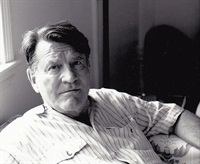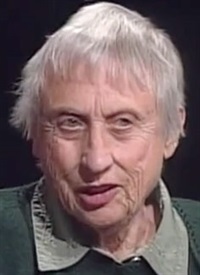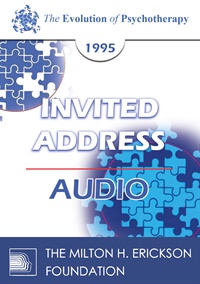EP95 Invited Address 03b - Changes in Therapy - Jay Haley, MA
- Average Rating:
- Not yet rated
- Topic Areas:
- Invited Addresses | Psychotherapy
- Categories:
- Evolution of Psychotherapy | Evolution of Psychotherapy 1995 | Pioneers in Couples and Family Therapy
- Faculty:
- Jay Haley, MA | Mary Goulding, MSW
- Duration:
- 1 Hour 20 Minutes
- Format:
- Audio Only
- Original Program Date:
- Dec 13, 1995
- License:
- Never Expires.
Description
Description: This session covers changes in psychotherapy, focusing on shifts driven by funding, client needs, and court involvement. It contrasts directive and non-directive approaches, highlights the rise of brief, problem-focused therapy, and critiques early psychoanalytic views. Emphasis is placed on balancing therapist guidance with patient-centered goals.
Moderated by Betty Alice Erickson, MS
Syllabus Description: In the 1990's all factors of therapy are changing. The way of financing therapy is changing, there are new types of clientele, there are striking differences in ideology and the training of therapists is becoming a new kind of enterprise.
Educational Objectives:
- To describe the general origins of different therapy approaches.
- To describe the social context effecting therapy.
- To illustrate professional differences in therapy.
*Sessions may be edited for content and to preserve confidentiality*
Credits
Handouts
| Timestamped Transcript (1006.7 KB) | 24 Pages | Available after Purchase |
| Ericksonian Learning Snapshot (243.8 KB) | 2 Pages | Available after Purchase |
Faculty

Jay Haley, MA Related Seminars and Products
Jay Haley (M.A., 1953, Stanford University) was Director of Family Therapy Institute of Washington, D.C. He was one of the leading exponents of the strategic/interpersonal approach to family therapy. Haley served as Director of the Family Experiment Project at the Mental Research Institute and as Director of Family Therapy Research at the Philadelphia Child Guidance Clinic. He has authoered seven books, co-authored two and edited five. Additionally, he has more than 40 contributions to professional journals and books. Haley is the former editor of Family Process, and the first recipient of the Lifetime Achievement Award of The Milton H. Erickson Foundation.

Mary Goulding, MSW Related Seminars and Products
Mary Goulding, MSW, is one of the leading exponents of Transactional Analysis. Along with her husband Robert Goulding, she developed an approach called Redecision therapy which synthesizes Transactional Analysis and Gestalt. Together they founded the Western Institute for Group and Family Therapy in Watsonville, California, and co-authored two professional books about their approach. There is also an edited volume about the Redecision model. Mary has served as a member of the Board of Trustees of the International Transactional Analysis Association and is a Teaching Member of that organization. Her M.S.W. was granted in 1960 from the School of Social Welfare, University of California, Berkeley.


